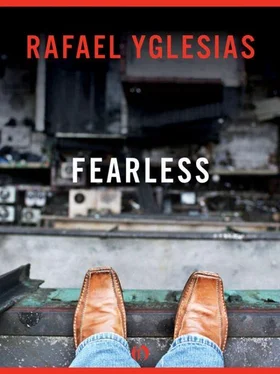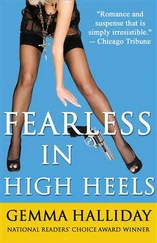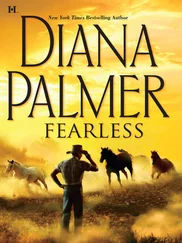“I do!” Byron repeated in a scream. “I’ve seen lots of dead bodies!”
Peter’s mouth puckered sourly as if he were tasting his son’s words. He said, “Hello,” to Max, trying to smile.
“They look really dead!” Byron screamed at Harry.
Harry’s thick eyebrows lowered as if trying to shade his eyes.
Not so eager for knowledge, are you? Max thought. Nan still held her arms up. Max looked at her black-cupped breasts. Had they always been so big? Why hadn’t he noticed? Some sort of polite blindness for Jeff’s sake?
“But they must have been mostly skeletons,” Jonah said.
“No they weren’t!” Byron continued to shriek.
“Byron,” Peter said softly, although he pronounced the n firmly. “Speak in a lower voice, please.”
“They had their skin!” Byron lowered his tone to the volume of mere shouting. “They were smashed—”
“Byron!” his mother shouted in a panic.
“I don’t mean them!” Jonah also shouted, arms out, frustrated. “I mean in the battle Grandpa was talking about!”
“We’re all going to go deaf,” Peter mumbled.
“I don’t know any black people,” Max announced to all of them. “When I was in school I knew lots of black kids.”
“What are you talking about, Max?” Nan said. She lowered her arms. With them down, although her highlighted breasts were less provocative, they looked even bigger.
“Civil War,” Max said. He passed between the Hummels and entered into the living room proper; he saw that Harry had the liquor out on top of the stereo cabinet. Should I get drunk? he wondered. That would make tonight more dangerous — but also less real. “All those dead,” he continued, considering whether to have Scotch or vodka. “Fought to free the slaves and I live in a supposedly integrated city — our mayor’s black — and I went to public schools and I marched on Washington and I don’t know a single black.”
“I do,” Diane Hummel said. “I have two good friends who are black, I work with—”
“Are there any living in your apartment building?” Nan asked. “Any in your son’s school?” Nan laughed at herself, an apologetic guffaw.
“There are blacks in our…” Diane trailed off, uncertain.
“Only one and she’s there by marriage,” Peter said.
“By marriage?” his wife asked, sloshing her drink a little as she turned toward him abruptly. “What do you mean by that?”
“Anyway,” Peter said, making no response to his wife. “They didn’t fight to free the slaves. They fought for economic dominance.”
“It’s the same thing,” Max said.
“Well,” said Harry. He brushed his eyebrows with the thumb and ring finger of his right hand. “Well,” he said again and thrust out his chest, fingers still scratching the gray and black hairs. “I suppose in the ultimate sense a fight for what kind of economy a nation is going to have was necessarily a fight over slavery in the case of the United States, but Mr. Hummel is referring to whether the motivation was moral or pragmatic — and on that score—”
“I know what he was referring to, Harry,” Max said. “Don’t recapitulate the obvious.”
His father-in-law dropped his fingers from his eyebrows; they parted from his eyes, suddenly nude with surprise. Max decided to have a drink. He took the vodka in one hand, a glass in the other, and moved toward the ice. “The only reason historians make the economic point about the Civil War is so that we don’t feel morally inferior to the people who lived a hundred and thirty years ago. Plenty of them — even if they weren’t the majority — gave their lives for at least the stated goal of ending slavery. I don’t know anyone who would do that today. Anything else people say about the subject is just bullshit. The rest of its lessons are dead and uninteresting except to history nerds. They should be forgotten, not rehashed.” He had his drink made and he took a long swallow.
“That’s the new you, Max,” Nan said. She saluted him with her glass mockingly.
“What’s the new me, Nan?” Max asked.
“Expert on bravery and charity. They should have replaced Father Ritter with you.”
“They wouldn’t do that,” Max said. “I don’t believe in God and that means I can’t molest little boys, accept payoffs, or suck up to corrupt politicians.”
“Oh yes…?” Nan smiled; lasciviously, it seemed to Max. She approached him with her arm out like a grappling hook, only it was her drink at the end that threatened to stab and gather him to her. Instead, it went around his shoulder and moistened his shirt. He noticed she had covered her pink cheeks and forehead with lots of makeup. From a foot away he could smell its musty powder. She kissed him on the cheek, wetly, and whispered, “And why can’t you do those bad things?”
“Because there’s no one to forgive me,” Max said and pushed her a little, on her soft right hip, to move her enticing warmth away.
Nan skipped back a step gracefully. With a sweeping gesture, she brought her drink to her lips. “You’ve become a self-righteous asshole,” she said softly in a neutral tone.
A voice, reedy and full of hope, called into the living room from the hall. “Jonah?” it said. “Is Jonah here?” the voice pleaded.
“Yeah, I’m here,” Max heard Jonah answer. “I’m right in front of you.”
The grown-ups parted enough for Max to see the tableau: Jeff’s sons were in the hall. Sam, the older, had spoken. He was trailed by Jake, his four-year-old brother. Jonah left his grandfather’s side to stand almost nose-to-nose with his friend Sam. Jonah’s wide mouth displayed the unevenly sized teeth of a ten-year-old, front teeth as big as an adult’s, incisors small and still coming in; Sam beamed back with a mouth of oddly proportioned teeth. Instead of saying hellos, they laughed with delight at each other. Sam had his portable video game with him; a dirty white blanket with a frayed satin edge trailed behind little Jake.
“I was looking the wrong way into the living room!” Sam said in a nasal whine, his typical tone of voice. “I didn’t see you.”
“Well, I’m here, dummy,” Jonah said and touched the back of his friend’s head gently. “And you have Gameboy with you. Big surprise.”
“ Boxxil is really tough!” Sam said. He had switched on the game. His head was down; his thumb flickered speedily from button to button. A tinny electronic song could be heard.
“Did you die yet, Sam?” his little brother Jake asked and sniffled. A dark streak under his nose, a mix of dirt and smeared snot, gave him a fake Hitlerian mustache.
“My beautiful sons,” Nan said and cleared her throat.
Peter Hummel laughed, but briefly. It wasn’t clear if Nan was kidding.
Jonah knew instinctively they had become a spectacle for the grown-ups. He pulled on Sam’s elbow, but gently, respectful of the game in progress. “Let’s get out of here,” he said.
“On pause,” Sam said, pressing a button on the portable video game. The tinny music was stopped in mid-melody. “Change screens,” Sam said and ran out of sight. Jonah followed, laughing.
“Wait for me, guys!” little Jake yelled and lumbered after them, his blanket swishing on the floor.
“I thought we were going to watch the Civil War ,” Harry called to his grandson.
“Don’t want to!” Jonah shouted back.
Harry slumped, exaggerating his disappointment comically, but it wasn’t funny. There was too much real disenchantment in his eyes. “Well,” he gestured to Byron. “How about you? Do you care to learn anything about the most significant period of your country’s history?”
For an answer Byron turned to Max. “You said you were going to watch with me.”
Читать дальше












